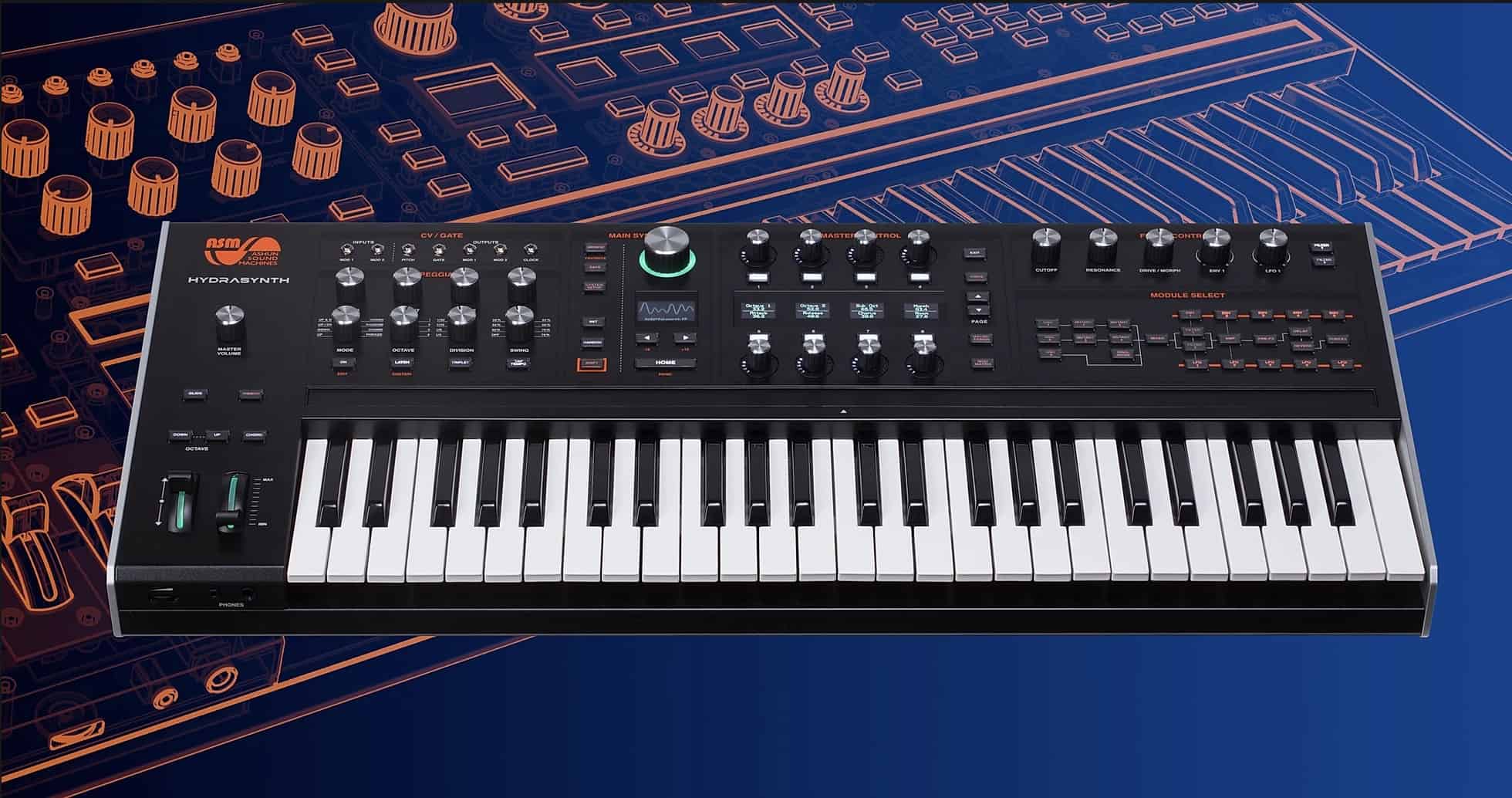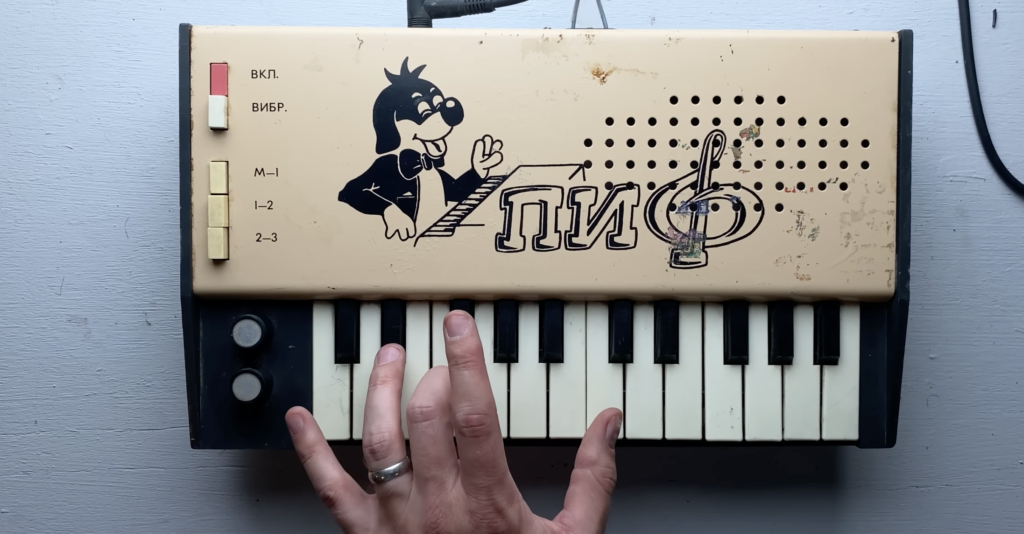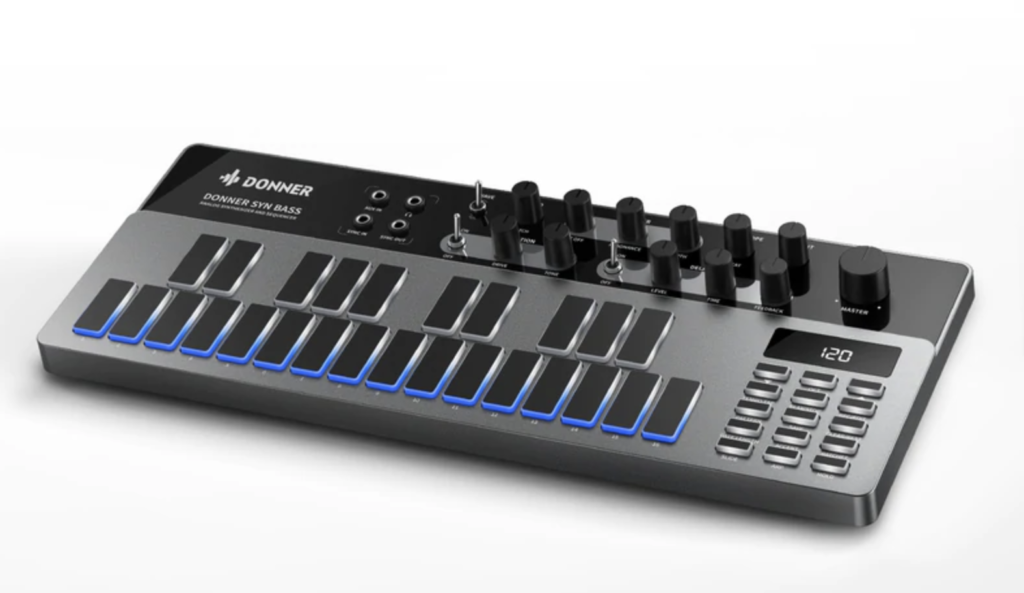Synthesizer
Ashun Sound Machines (ASM) Introduces Hydrasynth with Version 1.3.0 Firmware Update
2025

Hydrasynth by Ashun Sound Machines (ASM)
Ashun Sound Machines (ASM) advances its innovative Hydrasynth digital wave morphing synthesizer. Launched late last year to widespread critical acclaim as its inaugural hardware product, produced as a keyboard variant (featuring a proprietary PolytouchTM 49-note polyphonic aftertouch keybed and a user-assignable ribbon controller) and desktop variant (with 24 velocity- and polyphonic aftertouch- sensitive pads, plus an included 19-inch rack-mount kit).
he HYDRASYNTH keyboard is both a sound designer’s dream synth as well as a performing musician ideal. The sound engine is designed for maximum flexibility. At the same time, we designed the user interface in a way to allow you to edit the patch quickly with a minimal amount of paging and many workflow shortcuts.

Anchored around a unique digital wave morphing synthesis engine as an eight-voice polysynth whose three oscillators can all make use of any one of the 219 single-cycle waveforms available, while flexibly facilitating defining eight waveforms into a list and then morphing from one to the next using extensive movement-inducing modulation sources with Wave Scan mode (for OSC 1 and OSC 2 only), ASM’s avant-garde Hydrasynth made musical waves when unleashed upon an unsuspecting world with keyboard and desktop variants late last year. Said synthesis engine also features four mutators for further tonal modification, while two filters can be configured in parallel or series. Perfectly paired with an equally powerful effects section comprising four fully-independent modules, all creatively combine to produce sounds that have to be heard to be believed! Better still, the Hydrasynth keyboard’s proprietary PolytouchTM 49-note polyphonic aftertouch keybed instantly struck a major (and minor) chord with musicians wishing to better express themselves without having to master a new keyboard technique, while connectivity to the wider world is as far-reaching as it comes, courtesy of a full-blown MIDI (Musical Instrument Digital Interface) implementation — including the usual connection complement of MIDI IN, MIDI OUT, and MIDI THRU on five-pin DIN, as well as USB — complimented by conveniently-positioned CV/ GATE connections for mini-jacks (so playing nicely with the likes of today’s ever-widening world of Eurorack modular gear, vintage synthesizers, and more, is perfectly possible).

As ASM advances both Hydrasynth variants with the timely introduction of the Version 1.3.0 firmware update at The 2020 NAMM Show, its innovative instruments now support MPE (MIDI Polyphonic Expression). Advancement of the MIDI specification used by many alternative controllers, this allows for true polyphonic pitch bend as well as two dimensions of control between compatible controllers and sound generators. Get this, though: those musicians wishing to better express themselves are going to have a field day with Hydrasynth as ASM advances its innovative instruments ever closer to performance perfection! With Warm mode’s musically-pleasing arrival — also a result of the Version 1.3.0 firmware update, shaping the sound to better emulate the frequency response of some vintage synthesizers by rounding out the high end of any patch while giving it a gentle boost in the low end to create characteristic ‘warmth’ overall, surely sound designers are also going to be happy bunnies! Both performers and sound designers will welcome Hydrasynth’s MPE modulation additions via Version 1.3.0 — namely, new modulation sources, such as MPE-X (normally pitch bend control), MPE-Yabs (absolute mode, referred to as controller 74 in some devices), MPE-Yrel (relative mode, also referred to as controller 74 in some devices), and MPEoffVc (note-off velocity).
Timed to coincide with those welcomed advancement announcements, ASM is also offering its inaugural artist patch bank of 128 sounds — courtesy of Matia Simovich (a.k.a. INHALT) — as a downloadable creative collection focusing on classic, stable, and highly-playable, expressive synthesizer tones to complement Hydrasynth’s factory presets.
Privileged attendees of The 2020 NAMM Show surely owe it to themselves to swing by Booth 10405 there to see and hear ASM putting the advanced Hydrasynth through its impressive paces.
Hydrasynth is available to purchase through ASM’s growing global network of authorized dealers at an MSRP of $1,599.00 USD ($1,299.00 USD MAP) for the keyboard variant and at an MSRP of $999.00 USD ($799.00 USD MAP) for the desktop variant.
For more in-depth info, please visit the dedicated Hydrasynth desktop webpage here: http://www.ashunsoundmachines.com/hydrasynth-desk
Watch ASM VP of Products Glen Darcey’s helpful Hydrasynth updater video here: https://youtu.be/HYf_rNkFPg0

One of the unique things about the Pocket Miku project is that it is a vocal synthesizer that is inspired by Vocaloid Hatsune Miku (初音ミク) , and yet it is not a Vocaloid in its own right. It uses existing vocal synthesizer technology from Vocaloid 2/3/4, but then repurposes it and adds features to make it a unique vocal synthesizer in its own right.
Gakken’s “Pocket Miku”
In a ribbon synthesizer, make music, write music, and sing with the world’s most famous virtual vocaloid pop star. A stylus for playing and a 3.5mm/0.125″ output are included with this 16-key NSX-39 keyboard. Five distinct sounds are available: A – E – I – O – U, with vibrato, octave control, and volume and vowel control.
About Gakken
Gakken was established in 1946 as a Japanese publishing house. They started selling instructional toys, books, periodicals, and electrical kits in the 1970s. In Japan and the United States, their uniforms are noted for their innovative design, ease of use, and large cult following.
Vocal Synthesizer
A vocal synthesizer is a device that can generate artificial or computer-generated speech. It is usually used to create singing or other sounds that are impossible to produce with the human voice. Vocal synthesizers can be used to create sounds that are similar to the human voice, or they can create entirely new and unique sounds.
Vocal synthesizers are pieces of audio equipment specifically made to produce sounds similar to a human voice. They can be used to create sounds that are similar to a real-life voice, or they can be used to create unique sounds. These extraordinary sounds can include anything from animal noises to electronic beats. With the recent development of software and technology, vocal synthesizers have become easier to use, allowing any person to create his or her unique sounds.
How Musicians can use a Vocal Synthesizer
A vocal synthesizer can be a powerful tool for musicians, allowing them to create and manipulate sounds that would otherwise be impossible to produce. Using various techniques, musicians can use a vocal synthesizer to develop new and unique sounds or imitate other instruments’ sounds. Vocal synthesis can create eclectic sounds, from simple melodies to complex textures.
By varying the pitch, timbre, and envelope of the sound, musicians can create infinite possibilities. By experimenting with different settings, musicians can find the perfect sound for their music. A vocal synthesizer can also be used to imitate the sounds of other instruments. By matching the pitch and timbre of the sound, musicians can create a realistic imitation of another instrument.
This can be useful for creating new textures and layers in a composition. Vocal synthesis can be a powerful and versatile tool for musicians. By experimenting with different settings, musicians can make various sounds, from simple melodies to complex textures. By matching the pitch and timbre of the sound, musicians can also create realistic imitations of other instruments.
Microcosm
Microcosm is an incredibly versatile machine that can create striking ambient effects to tight, tap-tempo synchronized rhythms. By utilizing granular sampling, delay, and looping techniques, Microcosm can take your sound and completely transform it into something new and exciting. This machine can do everything if you want to create cascading micro-loops, diffused drones, or hypnotic textures. David uses the Microcosm in his video below.

Do you remember the good old days of Soviet Russia? If you’re a fan of analog synthesizers, then you’ll love the new Soviet PIF Synth! This adorable little synth is perfect for children, and it comes with a FREE sample library that will give you hours of fun!
Soviet PIF Synth
These colorful little synths were clearly designed with children in mind. They are small and lightweight, making them easy to carry around. The controls are large and brightly colored, making them easy to use. And the sound quality is surprisingly good for such a small and inexpensive instrument.
The Pif was produced from roughly 1989-1993 in a city called Ромны in Ukraine. The factory that produced them, Роменский завод АТС, specialized in industrial telephone equipment, but also made several consumer products including this synthesizer.
Despite their child-friendly design, the Pif synths are capable of producing a wide range of sounds, from energetic dance beats to atmospheric pads to serene melodies. Thanks to their affordability and portability, the Pif synths remain popular among musicians of all ages.

A Cute Analog Synthesizer for Children
The Soviet PIF Synth is a unique and powerful tool for anyone looking to create original and arresting sounds. The synth uses raw analog waveforms to generate its sound, resulting in a harsh and industrial sound that is perfect for any aggressive or dark production.
In addition, the synth comes with a wide variety of modulation options, making it possible to create complex and evolving soundscapes. The Soviet PIF Synth is a must-have for any serious producer looking to add some edge to their productions.
USSR Synths – The Best Soviet Synthesizers of All Time
The Soviet Union was a powerhouse when it came to synthesizers. Many of the best synths of all time were developed in the USSR, and they remain popular to this day. In this blog post, we will take a look at some of the best Soviet synthesizers ever made. We will discuss their features and how they have influenced music over the years. If you are interested in learning more about Soviet synths, this blog post is for you!
The first synth on our list is the Polivoks. This synth was developed in the early 1980s and it quickly became one of the most popular synths in the USSR. The Polivoks is known for its unique sound, which has been used by many famous musicians over the years. The Polivoks is also notable for its durability; many of these synths are still in use today, more than 30 years after they were first created.
Next on our list is the Formanta EMS-01. This synth was developed in the late 1970s and it was one of the first affordable synthesizers available to Soviet musicians. The Formanta EMS-01 is a simple yet powerful synth that can create a wide variety of sounds. This synth is still used by many musicians today, and it remains a popular choice for those looking for an affordable and versatile synth.
Free Soviet PIF Synth Sample Library
This sample library performs with the FREE DecentSampler plug-in. You can download the Decent Library here.
-

 Vetted2 weeks ago
Vetted2 weeks ago11 Best Gore Websites to Explore the Darker Side of the Internet
-

 Vetted3 days ago
Vetted3 days ago15 Best Essential Oils Brands to Elevate Your Aromatherapy Experience
-

 Vetted3 days ago
Vetted3 days ago15 Best Concrete Sealers for Ultimate Protection and Longevity
-

 Vetted6 days ago
Vetted6 days ago15 Best Fabric Softeners to Keep Your Clothes Soft and Fresh All Day Long
-

 Vetted5 days ago
Vetted5 days ago15 Best Minimalist Phones for Simplifying Your Life
-

 Vetted4 weeks ago
Vetted4 weeks ago15 Best Insecticides to Keep Your Home Bug-Free and Safe
-

 Vetted3 days ago
Vetted3 days ago14 Best Concrete Paints for Revitalizing Your Outdoor Space
-

 Vetted3 weeks ago
Vetted3 weeks ago15 Best Soldering Irons for Your DIY Projects – Top Picks and Reviews















